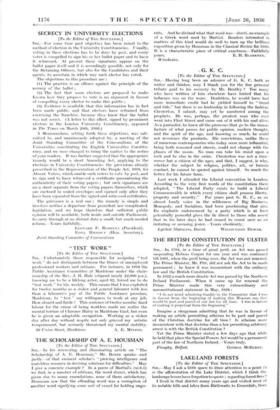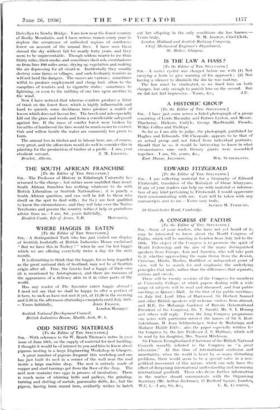LAKE-LAND FORESTS [To the Editor of THE SPECTATOR.] SIR,—May I
ask a little space to draw attention to a point i3 re the afforestation of the Lake District, which I think the landscape lovers have forgotten to quote ; regarding forest fires ?
I lived in that district many years ago and visited most of its notable hills and lakes from Birthwaite to Ennerdale, from
Helvellyn to Newby Bridge. I am now near the forest country of Rocky Mountains, and I have serious reason every year to deplore the occurrence of unlimited regions of coniferoui forest on account of the annual fires. I have seen them shroud the sky without fail for nearly forty years, and they seem to be unpreventable. Though seldom nearer to me than thirty miles, their smoke, and sometimes their ash, overshadows us from fires 100 miles away, drying up vegetation and making the air depressing for all creatic n. Incidentally they usually destroy some farms or villages, and such foolhardy tourists as will not heed the dangers. The causes are various ; sometimes wilful, to produce employment and cheap fuel; often to the campfires of tourists and to cigarette stubs; sometimes to lightning, or even to the rubbing of one tree upon another in the wind.
Now I have noticed that whereas conifers produce a litter of trash on the forest floor, which is highly inflammable and hard to quench, some deciduous trees produce a mulch of leaVes which does not favour fire. The beech and ash especially kill out the grass and weeds and form a considerable safeguard against fire. If the mass of conifer forest were broken by breadths of hardwood the fires would be much easier to control. Oak and willow beside the water are commonly too green to burn.
The annual loss in timber and in labour here, are, of course, very great, and the afforesters would do well to consider this in planting for the production of timber at a profit.—I am, your











































 Previous page
Previous page